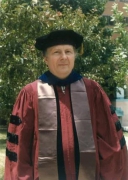J. Terry Ernest
* Deceased
William H. and Sallie E. Coleman Professor of Ophthalmology - 1980 - 1981

J. Terry Ernest was born in Sycamore, Ill. By age seventeen, he began work on a bachelor's degree in biology at Northwestern University. Dr. Ernest was a member of the University of Chicago community for most of his life, completing his M.D. there in 1961 and his PhD in visual science six years later. After spending a year as chief resident in ophthalmology at the University of Chicago Hospitals and Clinics, he joined the University's faculty. He proudly served as lieutenant colonel in the Army Medical Corps during the Vietnam War, and was stationed at Walter Reed Army Institute of Research in Maryland 1967-1970.
In 1970, Ernest returned to the University of Chicago, initially as assistant professor and then associate professor of Ophthalmology and Visual Science. In 1977, he went on to serve on the faculties of the University of Wisconsin, Madison, Indiana University Medical School, and the University of Illinois at Chicago.
By 1985, he returned to the University of Chicago for as professor and Chairman of Ophthalmology and Visual Science, a position he would keep until 2004. His expertise in fetal cell transplantation led him to advanced study of medical ethics, including a sabbatical from 2004 to 2005, during which time he devoted himself to medical ethics and law at the University of Manchester in England.
In 2002, he became the recipient of the first Cynthia Chow Professorship and retained that title through 2011. Dr. Ernest received many awards during his career, including a Research Career Development Award from the National Institutes of Health, a Heed Ophthalmic Foundation Award and an Honor Award from the American Academy of Ophthalmology. He was featured in Chicago magazine's "Best Doctors" list in 2001 and was a member of many academic societies, including the American Association for the Advancement of Science (AAAS) and the American Ophthalmological Society. So great was his desire to teach and serve that he continued to see patients in clinic until 2007.

